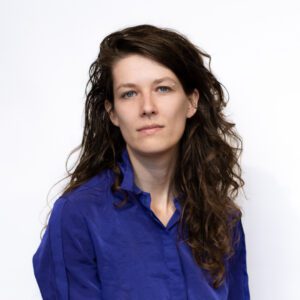Een voorstelling van Enkidu Khaled en Joachim Robbrecht waarbij een panel van kunstenaars en sprekers de impact van oorlog op het klimaat proberen te counteren. Door inhoud, op een artistieke of theatrale manier, voor te dragen. Storytelling, visuele kunst, muziek en dans passeren de revue. Hoe grijpt oorlog in op het milieu en wat kunnen ze daar tegenover stellen?
Theatermakers Enkidu Khaled en Joachim Robbrecht kapen het concept van de ‘think tank’. Geïnspireerd door de Koude Oorlog, toen beleidsmakers, industriëlen, militairen én kunstenaars samenkwamen om na te denken over de toekomst van oorlog, creëren ze een interdisciplinair, experimenteel forum met activistische en artistieke vrienden. Ze verkennen in ‘Tank Tink’ de verwoestende impact van oorlog op het milieu en brainstormen over mogelijke tegenmaatregelen.
Militaire operaties kosten bergen geld en energie. Om de planeet te verwoesten, niet om haar te redden. Ze vervuilen en vernietigen bossen en zeeën door de productie van verbijsterende hoeveelheden puin. Allemaal ellende met als cynisch doel: toegang tot grondstoffen als olie, water en mineralen verkrijgen. Op steeds meer plekken ter wereld raakt de natuur zo vervuilt dat de mens haar maar ‘teruggeeft’. Een vergiftigd geschenk.
Khaled en Robbrecht counteren deze horror met beelden van satire, wanhoop en verzet, samen met performers Ogutu Muraya & Caroline Ngorobi, schrijver Chris Keulemans en kunstenaars Samah Hijawi, Anika Schwarzlose en Brian McKenna.
Achtergrondinformatie over het stuk
Ogutu Muraya en Caroline Ngorobi plaatsen twee oorlogen in Kenia naast elkaar. Het verhaal van de onafhankelijkheidsstrijders die in de jaren 50 uit het Aberade bos werden gerookt. En de voortdurende oorlog in Boni Forest dat de Keniaanse regering in brand steekt op zoek naar ‘terroristen’.
Schrijver Chris Keulemans laat de zandstormen zien die steeds vaker over Irak razen. Roze wolkenvelden vol dodelijk, niet af te breken uranium, een erfenis van de Amerikanen.
De hypnotiserende beelden en muziek van Anika Schwarzlose en Brian D. McKenna nemen ons mee tot waar achtergelaten oorlogsinfrastructuur is vergroeid met de aarde.
Samah Hijawi presenteert een lecture performance die het werk van Palestijnse kunstenaars combineert met reflecties over het sociale contract van kunst.
Enkidu Khaled, die theater leerde maken tijdens de oorlog in Bagdad, kan zich ook vanavond niet losmaken van de destructie die hij wilde ontvluchten.
Joachim Robbrecht, schrijver van de The Great Warmachine, vraagt zich af of we tekenen zien dat de planeet wraak begint te nemen op die obstinate oorlogsvoerders, op ons.
Text in EN
Enkidu Khaled and Joachim Robbrecht see how man’s wars are mutilating our planet and making it uninhabitable. That’s why they hijack the term think tank. During the Cold War, policymakers brought in industrialists, military personnel and artists behind closed doors to brainstorm about the future of war. Interdisciplinary, experimental, disastrous. Now the two theater makers bring artistic and activist friends together in a Tank Tink. To talk about how war affects the environment. And to consider what we can do in return.
Military operations cost mountains of money and energy. To destroy the planet, not to save it. They pollute and destroy forests and seas. They produce mind-boggling amounts of debris. And top cynicism: they often revolve around access to resources such as oil, water and minerals. In more and more places around the world, nature is becoming so polluted that humans are just ‘giving it back’. A poisoned gift.
Khaled and Robbrecht counter this horror with images of satire, despair and resistance, together with Ogutu Muraya and Caroline Ngorobi, two storytellers from Kenya, with writer Chris Keulemans, artists Anika Schwarzlose and Brian McKenna and the Palestinian artist Samah Hijawi.
Ogutu Muraya and Caroline Ngorobi, two storytellers, performers and writers from Kenya, juxtaposition two wars – the story of the independence fighters smoked out of the Aberdare Forest in the 1950s, and an on-going war in Boni Forest, that the government is now burning in search of today’s terrorists.
Chris Keulemans shows us the sandstorms that increasingly sweep across Iraq, red cloud fields full of deadly, unbreakable depleted uranium, a legacy of the Americans.
The hypnotic images and music of Anika Schwarzlose and Brian D. McKenna take us to where war infrastructure left behind has fused with the earth.
Samah Hijawi presents a lecture performance that combines the works of Palestinian artists, with reflections on the social contract of art.
Enkidu Khaled, who learned to make theater during the war in Baghdad, again tonight cannot detach himself from the destruction he wanted to escape.
Joachim Robbrecht, author of The Great Warmachine, wonders if we are seeing signs that the planet is beginning to take revenge on those obstinate warriors, on us.
Line-up
Concept
Enkidu Khaled en Joachim Robbrecht
Met: Sara Dziri, Samah Hijawi, Anika Schwarzlose, Ogutu Muraya, Caroline Ngorobi, Chris Keulemans, Brian McKenna, Joachim Robbrecht, Enkidu Khaled,
Productie
Platform 0090, VZW Kunstenwerkplaats -KW, Kaaitheater, Theater Rotterdam, Monty.
Subsidient – VGC.
Ook in De Balie

Waar is Sarah?

Amsterdam van het gas af



